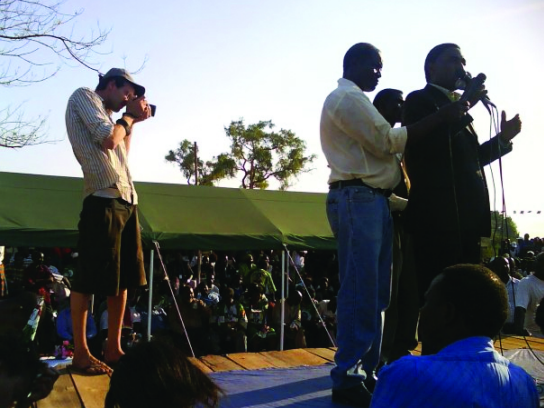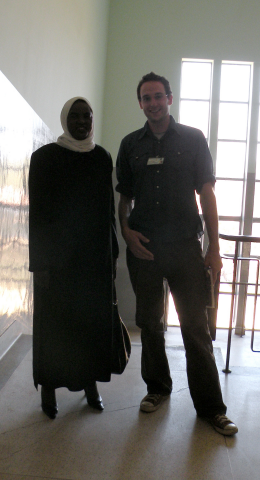Print Edition: October 17, 2012

(Below) Fleet and Grace Shafiq, the first female mayor of Livingstone, Zambia.
Darren Fleet is an alumnus of UCFV and has worked at Adbusters Magazine for the last two years. He’s been involved in journalism for almost a decade, moving from work at UCFV’s student newspaper to writing for the Langley Advance, collecting a Masters in Journalism from UBC along the way.
Before Adbusters where were you working and what were you doing?
Well a couple cool things: in 2008 I had an internship with Journalists for Human Rights in Zambia, which was eight months. The job title was media trainer, so I was working with Zambian journalists in Livingstone and helping with getting more human rights content into their media. But I was also working on skills and stuff, story outlines writing and photography.
The best part about that, though, was actually being in Livingstone and being in South Central Africa. Honestly, it was an incredible cultural experience; I got to meet the old Dictator and the President. It was absurd in many ways, but quite often inspiring.
I’m actually planning to go back this May because there are a couple stories I would like to do that I think are important.
Your time here at UFV: did it help you build your future and get you to where you are?
I was only at UFV for two years. When I started at UFV during my first week it was 2001. During my first ever Political Science class, September 11 happened. It was a mind-blowing time. It was quite interesting to start studying political science in the context of that event happening.
I was also on Student Council when I was at UFV and the time I was there was when the tuition freeze was being lifted in British Columbia. At a board of governors meeting—I might not have even been on Student Council at that point—I went in and we were saying not to raise the tuition because [we felt] they didn’t really have to, and I made this promise that if they raised the tuition I would leave the school.
The dean at the time had done a lot for the university and I think that all deans kind of had a gun to their backs. The government wasn’t going to give them any more money so if they wanted to carry on, they would have to raise tuition.
So I finished with my Liberal Arts Diploma and went to SFU. It was probably good because there wasn’t a lot of the type of history I was interested in doing at UFV, at that time.
In total I think I did 69 credits at UFV. I loved it and it kind of broke my heart to leave. I really loved the art galleries; I would always go and walk through it.
I’ve been here almost two years. Most people who work in media probably have a story similar to this one, which is I didn’t apply for the job – it kind of fell into my lap.
I’ve never met a journalist who doesn’t have a story like this. I think someone I knew had applied for the job, got it, didn’t want it, [and] said to call their friend Darren.
So I started out being a freelance editor, which is weighing in on some concept of the magazine, writing a few small pieces and then editing some things. That developed into being an associate editor, and I did that for about a year. We just had a pretty big staff turnover so now I’m senior editor.
We’re a small team; there are only about 11 of us. One day I just looked at the map and it said I was the senior editor. I don’t think they even told me. It’s kind of an office joke. My role hasn’t really changed.
The other awesome thing we have been doing, which I am most excited about, is publishing a book. It’s called Mean Wars: The Creative Destruction of Neoclassical Economics. It’s been in the works at Adbusters for four years. It kind of got put on the backburner, and then obviously with Occupy Wall Street it was renewed with vigour. We put in our final touches in June and it comes out in November.
It’s been a pretty cool two years. I used to want to work at Adbusters in 2007, but then after journalism school I always thought I would work in film. The reason I took a Masters of Journalism at UBC was because I wanted to learn film. I’m surprised to still be in print.
It’s a dream job though, definitely the best job I have had. Kind of feels like working for a student newspaper. It reminds me of The Cascade and the Toque.
How was your time with The Cascade? What is the Toque?
Well, when we started at UCFV, The Cascade was horrible. It was run by some pretty conservative people, and it was lame. The issue that ran us over the edge had flower bouquets on the cover.
I came late to the table, but this group of students started a radical publication called the Toque. I joined in a few months later after I read the first copy. I thought it was amazing, so I started submitting for the publication. Eventually we ran a student referendum to have the Toque made the student newspaper. I think we won the referendum, but it was a negotiating process.
The Cascade refused to hire us – they completely ignored us. I think we worked out a deal, where the Toque and The Cascade would merge, but the name would stay the same. At the end of the academic year I was there, the two decided to merge. We had a pretty intense meeting, were we cast votes on who was going to be the staff of the new Cascade.
It ended up being a complete purge; I think there was only one person remained from the original Cascade. That’s when we created other positions, like the staff writers and paid editors. We just wanted to get people to write and give them a chance.
Where would you like to be in five years from now?
I want to be living in Zambia. I just started a PhD in Communications at SFU, but my long-term goal has always been to live in that part of the world. It would be amazing to work at a university there. I recommend to anyone on Earth to go there!
This interview has been edited for length and clarity.


